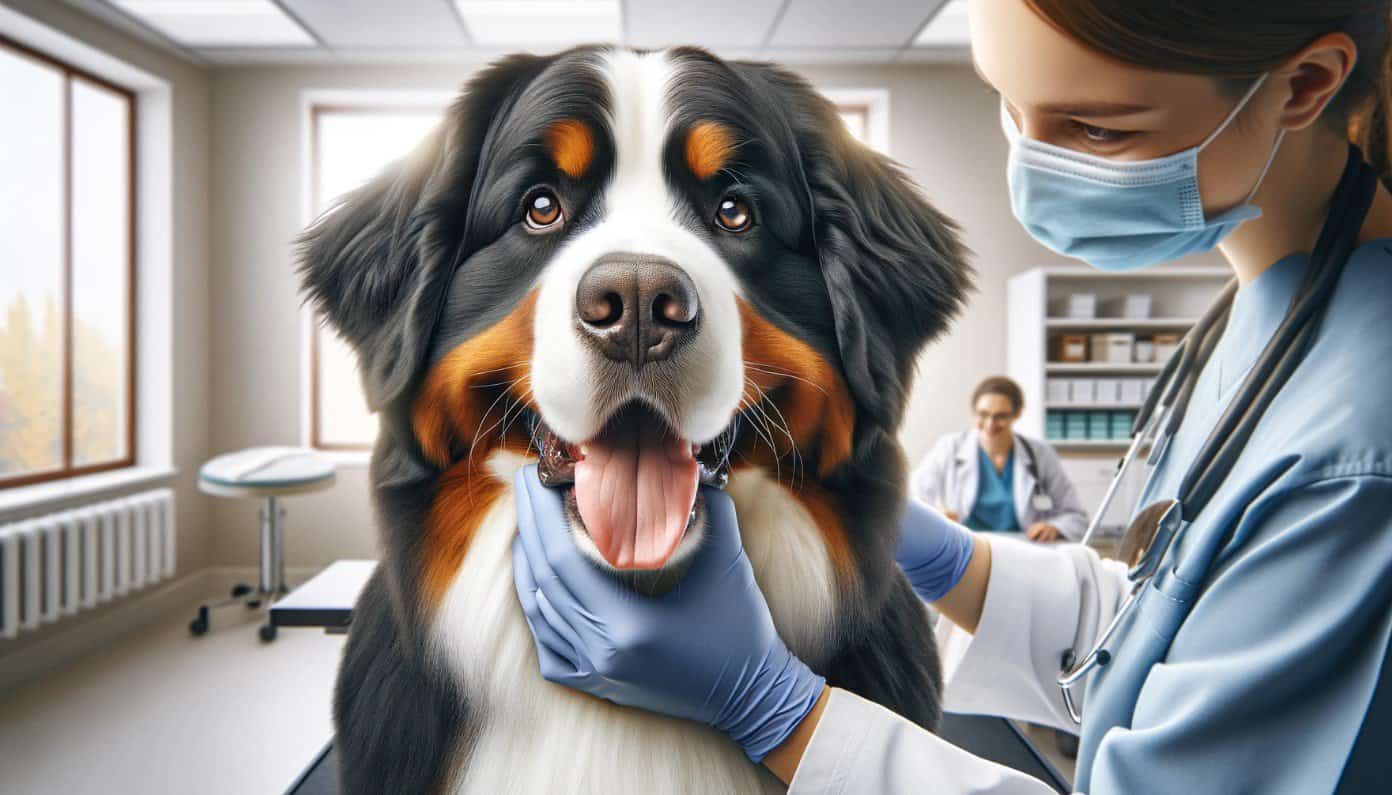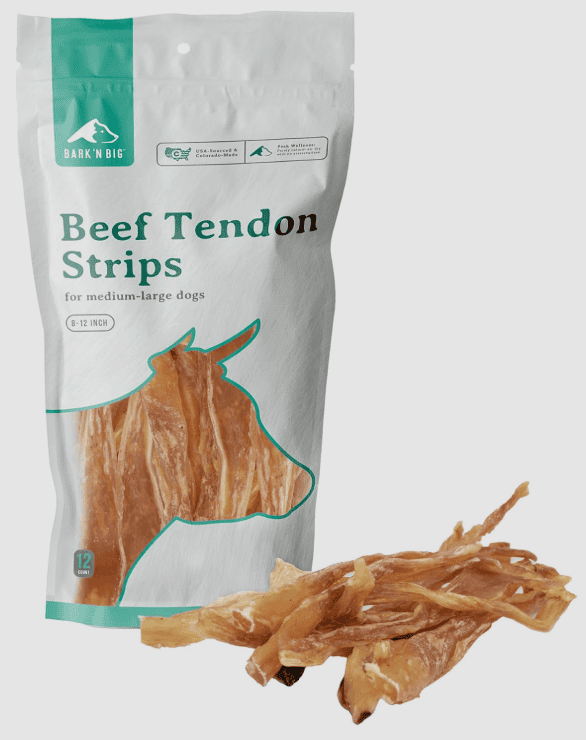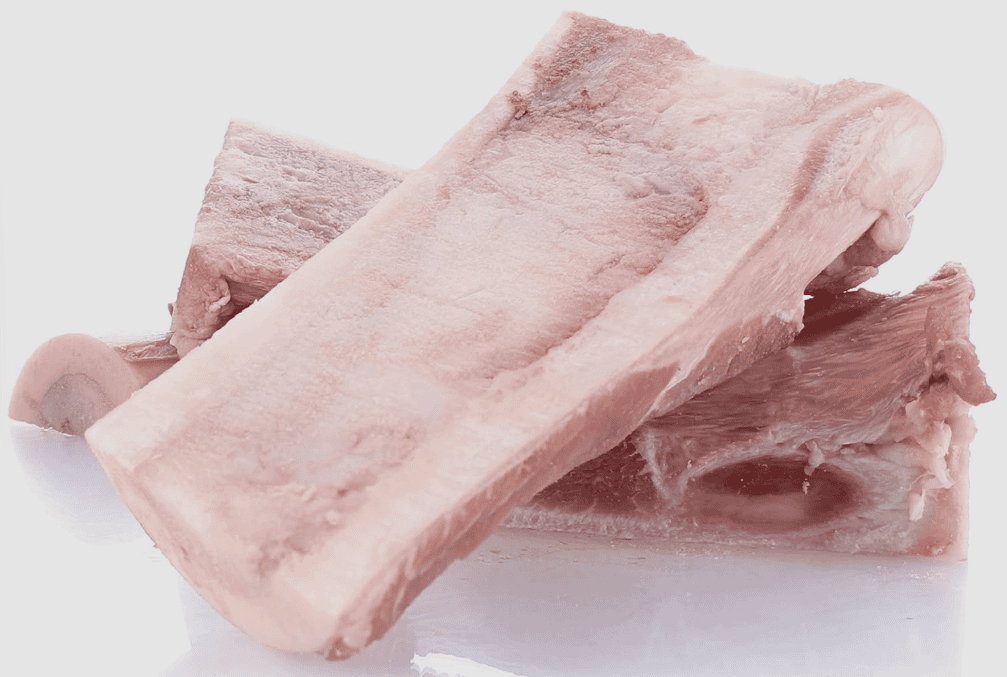Hey there, fellow dog parent! I’m Dr. Candy, your friendly holistic veterinarian. Today, let’s talk about our lovable Bernese Mountain Dogs and their dental health. Bernese Mountain Dog Dental Health is a topic close to my heart as it’s often overlooked, yet it plays a crucial role in their overall wellbeing.

Did you know that dental disease can lead to serious health issues like heart disease and kidney problems in dogs? That’s why it’s so important to keep an eye on your Bernese Mountain Dog’s oral hygiene. From teeth cleaning to recognizing signs of dental disease, we’ll cover it all. We’ll also explore some common dental problems in Bernese Mountain Dogs and how to address them.
And don’t worry, I’ve got some holistic solutions up my sleeve too. We’ll talk about diet, probiotics, and even some of my recommended dental chews and products. So, let’s put a stop to bad breath and ensure our Bernese Mountain Dogs have a healthy, happy smile!

Signs of Dental Disease in Bernese Mountain Dogs
As a caring Bernese Mountain Dog parent, it’s crucial you are aware of the signs of dental disease. Just like in humans, dental health in dogs is a crucial aspect of their overall wellbeing. However, unlike us, dogs can’t express their discomfort verbally, which makes it even more important for us to be vigilant in spotting any potential dental issues.
One of the most obvious signs of dental disease in your Bernese Mountain Dog is bad breath. While doggy breath might not be the most pleasant at the best of times, a persistently foul smell could indicate a problem. Other signs include a sudden change in eating or chewing habits, excessive drooling, and a noticeable discoloration of the teeth.
Moreover, if your Bernese Mountain Dog seems to be pawing at their mouth more than usual, this could be a sign of discomfort or pain. Swollen or bleeding gums, visible tartar, and difficulty picking up food are also common symptoms of dental disease.
- Bad breath
- Change in eating or chewing habits
- Excessive drooling
- Discoloration of the teeth
- Pawing at the mouth
- Swollen or bleeding gums
- Visible tartar
- Difficulty picking up food
It is essential to note that these signs can often be subtle and easy to miss, especially in the early stages of the disease. Regular check-ups with a vet are vital to ensure that any potential issues are caught early on.
When it comes to Bernese Mountain Dog Dental Health, early detection is key. The sooner these conditions are identified, the easier they are to treat, and the less discomfort your beloved pet has to endure. Therefore, being aware of these signs and taking prompt action can make all the difference in your dog’s oral health and overall wellbeing.
Remember, your Bernese Mountain Dog relies on you for their health and happiness. By keeping a close eye on their dental health, you can ensure they live a long, comfortable, and happy life.
Common Dental Health Issues In Bernese Mountain Dog
As a veterinarian, I’ve seen many Bernese Mountain Dog dental health issues. These dogs are prone to some specific dental problems that every responsible dog parent should be aware of. Understanding these issues can help you spot the early signs and seek prompt treatment, ensuring your furry friend maintains a healthy mouth.
Most commonly, Bernese Mountain Dogs suffer from:
- Periodontal disease: This is a common issue in many dog breeds, including Bernese Mountain Dogs. It starts with the buildup of plaque and can progress to severe gum disease if not treated. Signs include bad breath, red or swollen gums, and tooth loss.
- Broken teeth: Bernese Mountain Dogs love to chew, which can sometimes result in cracked or broken teeth. This can cause pain and lead to infections if not treated promptly.
- Tooth decay: Just like in humans, dogs can also suffer from cavities. Regular teeth cleaning can help prevent this.
It’s essential to maintain regular Bernese Mountain Dog teeth cleaning to prevent these issues. Regular veterinary checks are also crucial for early detection and treatment of these common dental problems in Bernese Mountain Dogs. Remember, your dog’s dental health is an integral part of their overall health and wellbeing.

Conventional Dental Health Treatments for Bernese Mountain Dogs
When it comes to maintaining the dental health of your Bernese Mountain Dog, there are several conventional treatments available. One of the most common methods is anesthetic dental cleanings.
Anesthetic Dental Cleanings
Anesthetic dental cleanings are performed under general anesthesia. This process allows the veterinarian to thoroughly inspect your dog’s mouth, removing tartar and plaque build-up, and checking for any signs of dental disease. Though this method is comprehensive, it’s important to understand that anesthesia always carries some risks, especially for Bernese Mountain Dogs with potential individual health obstacles.
Potential Individual Health Obstacles
It’s important to note that some Bernese Mountain Dogs may have health conditions that can make anesthesia riskier. For instance, dogs with heart problems might have complications with anesthesia. Similarly, some dogs may have drug sensitivities that could react adversely with the anesthetics used.
Additionally, dogs with a history of seizures may also face increased risks during anesthetic dental cleanings. Likewise, if your Bernese Mountain Dog is of extreme age, the risk of complications increases. It’s essential to discuss these potential risks with your veterinarian before proceeding with anesthetic dental cleanings.
Remember, every Bernese Mountain Dog is unique, and what works for one might not necessarily work for another. It’s crucial to consider your pet’s overall health, age, and specific needs when deciding on the right dental health treatment.
Ultimately, maintaining your Bernese Mountain Dog’s dental health involves a combination of regular veterinary check-ups, a balanced diet, and consistent at-home oral hygiene practices. Regular brushing and the use of dental chews can go a long way in preventing dental disease.
By understanding the conventional dental health treatments available and considering your dog’s individual health obstacles, you can help ensure your Bernese Mountain Dog maintains a healthy and happy smile.
Dr. Candy’s Holistic Approach To Oral & Dental Health
As a pet parent, you want the best for your Bernese Mountain Dog, and that includes their dental health. I’m Dr. Candy, and I believe in a holistic approach to your furry friend’s oral hygiene. Let’s take a look at how diet and probiotics can play a significant role in maintaining your Bernese Mountain Dog’s dental health.
Diet – Low Carbs, Avoid Added Sugars, Enzymes In Fresh Food
Firstly, let’s talk about diet. A diet low in carbohydrates is essential for your Bernese Mountain Dog’s dental health. Carbs can stick to your dog’s teeth, leading to plaque build-up and eventually tooth decay. So, try to avoid feeding them foods high in carbs.
Added sugars are another culprit. They can lead to tooth decay and even obesity in your dog. Always check the ingredients of your dog’s food and treats to ensure there are no added sugars.
Lastly, fresh foods are a great source of enzymes that can help maintain your dog’s oral health. These enzymes can naturally clean your dog’s teeth and fight bacteria in the mouth. Foods like apples, carrots, and celery can be great options. Here’s a quick list:
- Apples (without seeds)
- Carrots
- Celery
Oral Health Specific Probiotics
Next, let’s talk about probiotics. Probiotics are beneficial bacteria that can help maintain your dog’s oral health. They can balance the bacteria in your dog’s mouth, preventing harmful bacteria from causing dental problems.
I recommend Probiora for Dogs, an oral health targeted probiotic. It’s designed specifically for dogs and can help maintain your Bernese Mountain Dog’s dental health.
Remember, a holistic approach to your Bernese Mountain Dog’s dental health includes regular teeth cleaning, a proper diet, and the use of probiotics. With these measures, you can help ensure your furry friend’s teeth stay healthy and strong.
Stay tuned for the next section where I will discuss recommended dental chews and products for your Bernese Mountain Dog. Together, we can achieve optimal Bernese Mountain Dog Dental Health!

Recommended Dental Chews & Products For Bernese Mountain Dog
When it comes to maintaining your Bernese Mountain Dog’s dental health, not all products are created equal. In fact, many of the commercially promoted dental chews you’ll find on shelves may be doing more harm than good. These products often contain artificial ingredients, added sugars, and even harmful chemicals that can disrupt your dog’s gut health. Furthermore, they rarely provide the deep clean they promise, merely masking bad breath without tackling the underlying issue of dental disease.
Another product to be wary of are drinking water additives. While these may seem like a convenient solution to bad breath, they can actually harm the beneficial bacteria in your dog’s gut. This imbalance can lead to a host of other health problems, including digestive issues and weakened immunity.
So, what should you be using to maintain your Bernese Mountain Dog’s dental health? Here are some recommendations:
Single Source Natural Proteins
One of the best things you can give your dog for their dental health is single source natural proteins. These include products like tendons, raw marrow bones, and bully sticks. These not only provide a great source of nutrition for your dog, but also act as natural toothbrushes, helping to remove plaque and tartar buildup.
Tendons
Tendons are a fantastic natural chew for your Bernese Mountain Dog. They are tough and fibrous, which helps to scrape off plaque and tartar from your dog’s teeth. Plus, they are a good source of protein and collagen, promoting good joint health.

Raw Marrow Bones
Raw marrow bones are another excellent choice for maintaining your dog’s dental health. They are a natural source of calcium and phosphorus, which are essential for healthy teeth and bones. Furthermore, the act of gnawing on bones can help to clean your dog’s teeth and gums.

Bully Sticks
Bully sticks are made from 100% beef muscle, providing a natural and digestible chew for your dog. They can effectively remove plaque and tartar and are a good source of protein. However, always supervise your dog while they’re chewing on a bully stick to prevent any choking hazard.

By choosing natural, single source proteins, you’re not only promoting your Bernese Mountain Dog’s dental health, but also ensuring they’re receiving quality nutrition. Remember, a healthy mouth is the first step in overall health and well-being for your dog. So, make the switch from commercially promoted dental chews and embrace natural, effective solutions for your Bernese Mountain Dog’s dental health.
Frequently Asked Questions
Q: How can I prevent bad breath in my Bernese Mountain Dog?
A: Regular dental care is essential. Brush your dog’s teeth daily using a dog-specific toothbrush and toothpaste. Additionally, provide dental chews or toys designed to promote oral hygiene.
Q: What are some signs of dental problems in Bernese Mountain Dogs?
A: Watch out for signs such as bad breath, swollen or bleeding gums, yellow or brown tartar buildup, loose teeth, difficulty eating, or pawing at the mouth. If you notice any of these, consult a veterinarian.
Q: Can diet affect my Bernese Mountain Dog’s dental health?
A: Yes, diet plays a role in dental health. Feeding your dog high-quality, balanced meals and avoiding excessive sugary or starchy foods can help maintain good oral hygiene.
Q: Are there any specific dental products recommended for Bernese Mountain Dogs?
A: Look for dental products specifically designed for dogs, such as toothbrushes, toothpaste, and dental chews. Consult your veterinarian for recommendations based on your dog’s specific needs.
Q: How often should I take my Bernese Mountain Dog for professional dental cleanings?
A: It is generally recommended to have professional dental cleanings for your Bernese Mountain Dog at least once a year. However, the frequency may vary depending on your dog’s dental health and your veterinarian’s advice.
